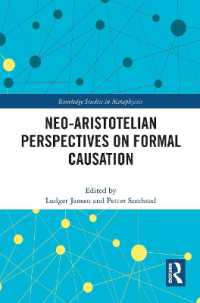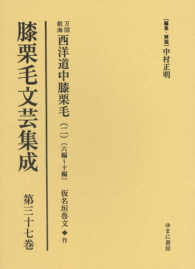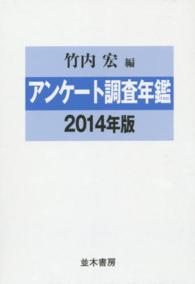基本説明
Today's formal linguists, cognitivists, functionalists, and Chomskyites all tread in Aristotle's footprints within the western classical tradition. Throughout the book contemporary views on the study of language are discussed with a view to establishing the contemporary philosophy of linguistics.
Full Description
"The Western Classical Tradition in Linguistics" examines ancient, medieval, post-renaissance, and modern conceptions of linguistics (i.e. the study of language and languages). It identifies a classical tradition to which modern linguistics owes a very clear debt. For example, Aristotle takes language to be (A) a symbolic system that represents (B) the world of our experience as it is contained within the mind. He believed (C) the world is external to human beings, who are all capable of (D) perceiving the same things within it. Finally, (E) Aristotle was only interested in form as a corollary of function. (A-E) have given rise to different developments in linguistics. (A) is a premise for all linguists, but has been developed, perhaps to its limits, in post Fregean semantics. From the last quarter of the 20th century, (B) has been pursued by cognitive linguists. (C) was taken up by the speculative grammarians of the late middle ages who looked to the structure of God's world as informing the structure of universal grammar.The rationalists of the 17th and 18th centuries took up (D), revising the interpretation of their speculative precursors to seek universal grammar in the God given rational minds of the human beings perceiving the world around them. Chomsky reinterprets the rationalist doctrine to seek universal grammar in the human mind while eschewing the relevance of human perception of anything other than linguistic input. Functional linguistics has picked up on (E). So, today's formal linguists, cognitivists, functionalists, and Chomskyites may often be at odds with each other, but all tread in Aristotle's footprints within the western classical tradition. There have been times when linguists stepped outside of the tradition, but they nearly always borrowed from it. Throughout the book, contemporary views on the study of language are discussed with a view to establishing the contemporary philosophy of linguistics.
Contents
1. Linguistics and the Western Classical Tradition 2. Plato on Language 3. Aristotle's Legacy 4. The Stoics and Varro 5. Quintilian, Dionysius and Donatus: The Start of a Pedagogic Tradition 6. Apollonius and Priscian, the Great Grammarians among the Ancients 7. Prescriptivism from the Early Middle Ages On 8. 'General' or 'Universal' Grammar: From the Modistae to Chomsky 9. Phonetics, Phonology and Comparative Philology 10. Language and Thought: From Epicurus until after Whorf 11. Saussurean and Functionalist Linguistics: The Study of Language as Communication 12. Paradigms for Linguistic Analysis: Bloomfieldian Linguistics and the Chomsky Revolution Epilogue








